
When Dragon Ball creator Akira Toriyama continued his franchise with the movie Dragon Ball Z: Battle of Gods (2013 Japan; 2014 U.S.), he introduced a character whose powers exceeded our Super Saiyan hero, Goku. His name: Beerus, god of destruction. Woe to those who rouse his temper. With but a wave of his claw, a whole planet could poof out of existence. Luckily, Beerus was impressed by Goku’s battle tenacity to go no further than a sparring match, while his taste buds were appeased by Earth’s culinary delights—like pizza.
The purple feline popped up again in a sequel movie, Dragon Ball Z: Resurrection of ‘F’ (2015), followed by regular appearances in a TV series, Dragon Ball Super (2015-2018), and now another movie, Dragon Ball Super: Broly (December 14, 2018 Japan; January 16, 2019 U.S.).
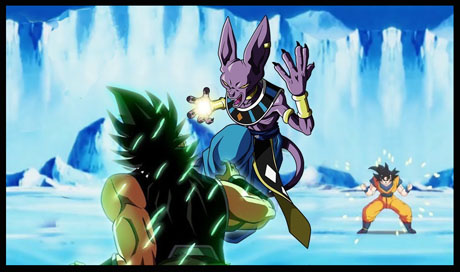
Beerus’s Japanese voice is provided by Kōichi Yamadera, while his English voice comes from Jason Douglas, who records in Texas for Funimation. Douglas is an accomplished actor known in live action as Satan in Preacher (2018) and Tobin in The Walking Dead (2015-2018). His voiceover work has surpassed 200 TV series, including such characters such as Il Palazzo in Excel Saga (1999-2000), Major Miles in Fullmetal Alchemist: Brotherhood (2009-2012), Aokiji in One Piece Film Z (2012), Miche Zacharius in Attack on Titan (2013-2017), and Tomomi Masaoka in Psycho Pass (2014). For Dragon Ball Super: Broly, in addition to Beerus he reprises King Cold, whom he earlier voiced in Dragon Ball Z Kai.
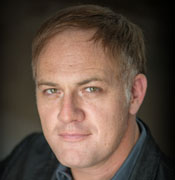
Jason Douglas
Douglas discussed his high-profile role in an interview on December 12th, 2018, a day prior to the English language premiere of Dragon Ball Super: Broly in Hollywood.
Bob Miller: At Anime Expo, you had said that Beerus was like a force of nature.
Jason Douglas: Sure.
BM: Now you’ve seen Broly, how has he evolved, if at all?
JD: When we met Beerus for the first time, we got to see him full-force fighting Goku. We also got to see him at kind of the height of his angstiness and some of his rage, and we’ve seen his destructive power. And I think as the franchise has evolved throughout the movies and as well as Super and now into Broly, I think we’ve now seen a more—dare I say—human side of Beerus, a vulnerable side. For me, I think he’s evolved as a character that has greater depth than we might have originally anticipated.
He’s excited about the potential of an existential challenge to his status as a destructor. But he also gets excited about tasting a new food, or filling his belly and refilling it. And there’s something about Beerus that is not quite satisfied to merely sit on the throne of immortality and occasionally hakai an offending planet. And so to me, that’s one of the most interesting things about how Beerus has evolved, is we’re seeing a much softer side to him, which I think makes him fascinating.
For the audience, I think it makes him intriguing and fascinating. But I also wonder if it doesn’t present a vulnerability as a destructor.
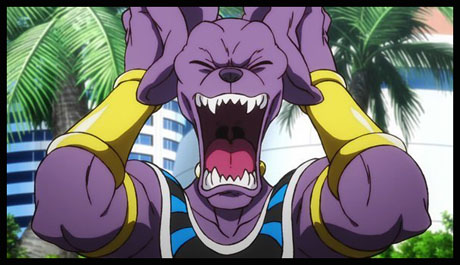
BM: And more satisfying to you as an actor.
JD: Well, it is satisfying because he’s not just a flat character. He has these levels. At one moment he seems like a malevolent force. Another minute, he’s stumbling over himself because he’s just so enamored by these flavors of something that Bulma has created, or he’s thrown into a fit of rage because he’s denied the opportunity to be the first to taste something or to get to it in time. So hitting all of those notes while still maintaining a core of who the character is certainly the challenge of the actor, and it’s what makes it, I think, most interesting.
BM: Now how do you approach the voice itself of that character? How would you describe it?
JD: Well, when I’m on my way to the studio, and particularly when I get into the booth, I sort of start swallowing in here, and then I sort of find a place that’s more in the back of my throat, and in my head a little bit. So I dip down into a lower register, and then I also found this idea that it’s not that he’s British, but sort of mid-Atlantic. So he’s clipped his diction as perfect as it needs to be, and very direct. It’s very erudite. His vocabulary I think is often the smartest on the show, and we find places sometimes where there’s room to interpret how to translate something. I always lean into the idea that, let’s have him sound smart. Let’s really lean into the idea that he’s a thinker, and he has a kind of dignity that you would expect from a king or somewhat of royal lineage, but he’s not someone that is—you can’t say that he’s either malevolent or benevolent. He sort of transcends that idea of good versus evil.
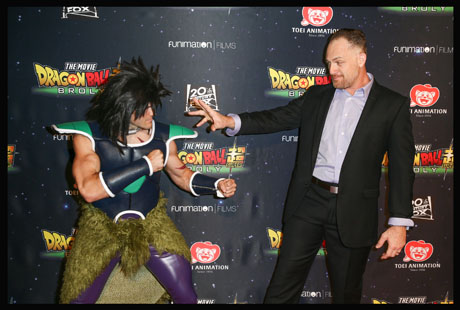
Jason Douglas (right) meets Broly in person at the premiere of ‘Dragon Ball Super: Broly at TCL Chinese Theatre on December 13th, 2018 in Hollywood, California.
(Photo by Rich Fury/Getty Images for Funimation)
That’s where the idea of him being a force of nature comes from, is that he serves a kind of higher purpose. He doesn’t need power for power’s sake. He’s not trying to satisfy some lust for power, like some big noble climber. He’s not. He’s the opposite of Frieza, who just lusts for power for power’s sake. He has it, he’s not terribly impressed with himself because of it, you know what I mean? I think there’s this idea that he does recognize the dignity and the necessity and the sense of purpose that his office has. But I just think that he’s been at it for so long that he’s hungry. We see that literally, he’s hungry all the time, he’s completely insatiable. But I think that’s a stand-in for something, for a bigger idea, that absolute power is ultimately not on its own. It’s not a thing unto itself. So I find it interesting, the idea that the show—at least as far as Beerus’ character arc—is gently exploring. We really haven’t dived into that philosophy yet.
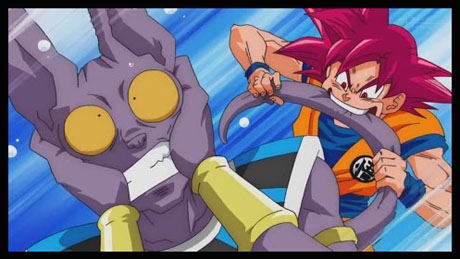
I think if we ever did a story on Beerus or a side story where we got to know a little bit more about him, that may be something that we get into. But yeah, my approach to the voice was originally like I do any character, which is to find something that resonates with what I’m seeing, and also it’s something that connects me. So when I do the Beerus voice, it connects me, the actor, to what I’m seeing on the screen, and it makes sense. When there’s a disconnect— sometimes as an actor you walk away from a show, particularly if it’s a lower budget show and they don’t have the budget, they don’t have the time, they might bring you in at the last minute on a character, and you’re just there and you do your best to do the lines, which you may not connect with the character in the way that you want to, and you might leave the studio feeling unsatisfied. We never felt like that was an option for this character, or for this show.
It had to be something that we all felt like, “Oh yeah, that’s right. That’s it. That’s the character.” By now, I’ve done Beerus enough that it’s easy to slip into his voice, and I do it for fans all the time when I meet them in person as they want to hear me say something as good, but it wasn’t as if it just came easily or naturally. It was something that was really discovered through a process early on.
Forbes magazine reports that in Japan, Dragon Ball Super: Broly earned the equivalent of $18 million in its first 11 days of release. Broly is slated to have its U.S. theatrical release on January 16th, 2019.
- INTERVIEW: Aaron Ehasz, Justin Richmond on “The Dragon Prince: Mystery of Aaravos”: The Right Choice for the Voice - March 20, 2024
- INTERVIEW: “The Dragon Prince” Influences, Inspirations, and the Mystery of Simpson - March 11, 2024
- INTERVIEW: The Magic of Her Voice: Paula Burrows of “The Dragon Prince” - October 4, 2023


 January 2nd, 2019
January 2nd, 2019  W.R. Miller
W.R. Miller  Posted in
Posted in  Tags:
Tags: 






